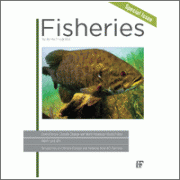Climate Change Impacts on Freshwater Fishes: A Canadian Perspective
AUTHOR(S): Mark S. Poesch, Louise Chavarie, Cindy Chu, Shubha N. Pandit, William Tonn
CITATION:
Poesch M.S., L. Chavarie, C. Chu, S.N. Pandit, and W. Tonn. 2016. Climate change impacts on freshwater fishes: A Canadian perspective. Fisheries 41(7):385–391. https://doi.org/10.1080/03632415.2016.1180285
ABSTRACT:
Current and projected patterns of global climate change are a major concern to freshwater fisheries in Canada. The magnitude of the impacts of climate change vary among species and ecoregions. The latest climate change scenario projections for Canada suggest that by 2050 temperatures will increase between about 4.9°C ± 1.7°C (average mean ± standard deviation) and 6.6°C ± 2.3°C under the Representative Concentration Pathways (RCPs) 2.6 and 8.5 emission scenarios, respectively. These changes will have an important influence on the physiology, distribution, and survival of freshwater fishes, as well as other ecological processes in direct, indirect, and complex ways. Here we provide a perspective from the Canadian Aquatic Resources Section on the impacts of climate change to freshwater fishes. Given the geographic size and diversity of landscapes within Canada, we have divided our perspective into three regions: eastern, western, and northern Canada. We outline the impacts of climate change to these regions and outline challenges for fisheries managers. Because climate change does not operate in isolation of other environmental threats, nor does it impact species in isolation, we suggest improved interjurisdictional integration and the use of an adaptive and ecosystem-based approach to management of these threats.
FULL TEXT – Poesch et al.



